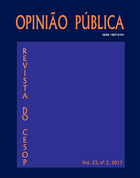Resumo
A União Europeia delega à Comissão Europeia poder exclusivo de iniciativa legislativa, o que permite que um organismo autônomo e pautado pelo senso de expertise possua legitimidade institucional para propor leis que contrariem interesses dos governos nacionais. A partir da análise da demissão voluntária da Comissão Santer e do processo de nomeação da Comissão Barroso, o artigo identifica um empoderamento do Parlamento Europeu principalmente no controle ex-ante da Comissão Europeia, quando confirma a escolha dos comissários, enquanto o poder de controle ex-post tem sido delegado ao presidente da Comissão, que tem se tornado um agente importante no gerenciamento de crises.Referências
Campos, C.; Carvalho, E.; Rocha, E. "The best you ever had: the political profile of the European commissioners", trabalho apresentado na 24º World Congress of International Political Science Association (IPSA), realizado em Poznan, Polônia, em 2016.
Dancey, C.; Reidy, J. Statistics without maths for psychology, 4ª ed. Essex: Prentice Hall, 2007.
George, A. L.; Bennett, A. Case studies and theory development in the social sciences. Cambridge, MA: MIT Press, 2005.
Hix, S. Executive selection in the European Union: does the commission president investiture procedure reduce the democratic deficit?. In: Neunreither, K.; Wiener, A. European integration after Amsterdam: institutional dynamics and prospects for democracy. Oxford: Oxford University Press, 2000.
Hix, S. “Constitutional agenda-setting through discretion in rule interpretation: why the European Parliament won at Amsterdam”. British Journal of Political Science, vol. 32, nº 2, p. 259-280, 2002.
Hix, S.; Follesdal, A. “Why there is a democratic deficit in the EU: a response to Majone and Moravcsik”. Journal of Common Market Studies, vol. 44, nº 3, p. 533-562, 2006.
Hix, S.; Hoyland, B. The political system of the European Union. London: Palgrave, 2011.
Hix, S.; Lord, C. “The making of a president: the European Parliament and the confirmation of Jacques Santer as president of the commission”. Government and Opposition, vol. 31, p. 62-76, 1996.
Judge, D.; Earnshaw, D. “The European Parliament and the commission crises: a new assertiveness?”. Governance: An International Journal of Policy, Administration, and Institutions, vol. 15, nº 3, p. 345-74, 2002.
Landman, T. Issues and methods in comparative politics: an introduction. New York: Routledge, 2008.
Lijphart, A. Modelos de democracia: desempenho e padrões de governo em 36 países. Rio de Janeiro: Civilização Brasileira, 2003.
Lindsay, J. “Congress and foreign policy: why the hill matters”. Political Science Quarterly, vol. 107, nº 4, p. 607-628, 1993.
Lindsay, J. “Congress, foreign policy, and the new institutionalism”. International Studies Quarterly, vol. 38, nº 2, p. 281-304, 1994.
Lindsay, J.; Ripley, R. B. “Foreign and defense policy in Congress: a research agenda for 1990s”. Legislative Studies Quarterly, vol. 17, nº 3, p. 417-449, 1992.
Majone, G. “Two logics of delegation: agency and fiduciary relations in EU governance”. European Union Politics, vol. 2, nº 1, p. 103-122, 2001.
McElroy, G.; Benoit, K. “Party groups and policy positions in the European Parliament”. Sage Publications, vol. 13, nº 1, p. 5-28, 2007.
Moravcsik, A. “In defence of the democratic deficit: reassessing legitimacy in the European Union”. Journal of Common Market Studies, vol. 40, nº 44, p. 603-24, 2002.
Putnam, R. “Diplomacy and domestic politics: the logic of two-level games”. International Organizations, vol. 42, nº 3, p. 427-460, 1988.
Putnam, R. Comunidade e democracia: a experiência da Itália moderna. Rio de Janeiro: FGV, 2000.
Schmitter, P. C. How to democratize the European Union… and why bother?. Lanham: Rowman and Littlefield, 2000.
Tostes, A. “Razões da intolerância na Europa integrada”. Dados, vol. 52, nº 2, p. 335-76, 2009.
Tsebelis, G. Atores com poder de veto. Rio de Janeiro: FGV, 2009.
A Opinião Pública utiliza a licença do Creative Commons (CC), preservando assim, a integridade dos artigos em ambiente de acesso aberto.

